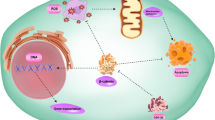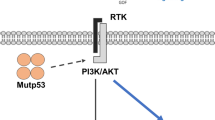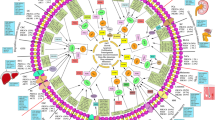Abstract
The tumor suppressor LKB1 gene encodes a serine–threonine kinase that regulates cell proliferation and polarity. Inactivation of LKB1 by mutations in LKB1 or loss of its expression is highly correlated with lung, ovarian, and pancreatic cancers, and WNT/β-catenin pathway is also known to be involved in many human malignancies. However, the relationship between LKB1 and WNT signaling pathway in esophageal carcinoma remains unknown. The expression of LKB1 in 62 cases of esophageal cancer patients was determined by quantitative real-time PCR. It was found that LKB1 mRNA level was significantly lower than the adjacent normal epithelium and that the LKB1 downregulation was correlating with TNM stages. Moreover, the expression of WNT target genes such as Cyclin D1, C-MYC, MMP2, and FZD2 was significantly upregulated in esophageal cancer tissues. LKB1 overexpression in TE10 cells inhibited TOPFlash luciferase reporter activity and WNT target gene expression even in the presence of WNT3A. Conversely, LKB1 knockdown enhanced WNT signaling activity in esophageal cancer cells. It was also found that LKB1 antagonized WNT signaling pathway through interaction with GSK3β to downregulate β-catenin expression level. Functional investigation revealed that LKB1 suppressed the promotion effects of WNT3A on the cell growth of TE10 cells. The LKB1 functions in regulating cell growth and WNT target genes expression were impaired by GSK3β inhibition, suggesting that LKB1 antagonized WNT-induced cell proliferation through enhancement of GSK3β activity. Together, the interaction between LKB1 and GSK3β upregulates GSK3β activity to suppress WNT-induced cell proliferation in esophageal carcinoma cells. Loss of LKB1 expression may result in the deregulation of WNT/β-catenin pathway to promote malignant progression of esophageal cancer.




Similar content being viewed by others
References
Vallbohmer D, Brabender J, Metzger R, Holscher AH. Genetics in the pathogenesis of esophageal cancer: possible predictive and prognostic factors. J Gastrointest Surg. 2010;14 Suppl 1:S75–80.
Klein CA, Stoecklein NH. Lessons from an aggressive cancer: evolutionary dynamics in esophageal carcinoma. Cancer Res. 2009;69:5285–8.
Knisely JP, Burtness BA, Salem RR. Surgical treatment of esophageal cancer. N Engl J Med. 2003;348:1177–9. author reply 1177–1179.
Kocher HM, Tekkis PP. Surgical treatment of esophageal cancer. N Engl J Med. 2003;348:1177–9. author reply 1177–1179.
Jiang W, Zhang YJ, Kahn SM, Hollstein MC, Santella RM, Lu SH, et al. Altered expression of the cyclin d1 and retinoblastoma genes in human esophageal cancer. Proc Natl Acad Sci U S A. 1993;90:9026–30.
Montesano R, Hollstein M, Hainaut P. Genetic alterations in esophageal cancer and their relevance to etiology and pathogenesis: a review. Int J Cancer. 1996;69:225–35.
Kuwano H, Kato H, Miyazaki T, Fukuchi M, Masuda N, Nakajima M, et al. Genetic alterations in esophageal cancer. Surg Today. 2005;35:7–18.
Igaki H, Sasaki H, Kishi T, Sakamoto H, Tachimori Y, Kato H, et al. Highly frequent homozygous deletion of the p16 gene in esophageal cancer cell lines. Biochem Biophys Res Commun. 1994;203:1090–5.
Ylikorkala A, Rossi DJ, Korsisaari N, Luukko K, Alitalo K, Henkemeyer M, et al. Vascular abnormalities and deregulation of VEGF in LKB1-deficient mice. Science. 2001;293:1323–6.
Watts JL, Morton DG, Bestman J, Kemphues KJ. The C. elegans par-4 gene encodes a putative serine-threonine kinase required for establishing embryonic asymmetry. Development. 2000;127:1467–75.
Hemminki A, Markie D, Tomlinson I, Avizienyte E, Roth S, Loukola A, et al. A serine/threonine kinase gene defective in Peutz-Jeghers syndrome. Nature. 1998;391:184–7.
van Lier MG, Wagner A, Mathus-Vliegen EM, Kuipers EJ, Steyerberg EW, van Leerdam ME. High cancer risk in Peutz-Jeghers syndrome: a systematic review and surveillance recommendations. Am J Gastroenterol. 2010;105:1258–64. author reply 1265.
Avizienyte E, Loukola A, Roth S, Hemminki A, Tarkkanen M, Salovaara R, et al. LKB1 somatic mutations in sporadic tumors. Am J Pathol. 1999;154:677–81.
Avizienyte E, Roth S, Loukola A, Hemminki A, Lothe RA, Stenwig AE, et al. Somatic mutations in LKB1 are rare in sporadic colorectal and testicular tumors. Cancer Res. 1998;58:2087–90.
Sato N, Rosty C, Jansen M, Fukushima N, Ueki T, Yeo CJ, et al. STK11/LKB1 Peutz-Jeghers gene inactivation in intraductal papillary-mucinous neoplasms of the pancreas. Am J Pathol. 2001;159:2017–22.
Wang ZJ, Churchman M, Campbell IG, Xu WH, Yan ZY, McCluggage WG, et al. Allele loss and mutation screen at the Peutz-Jeghers (LKB1) locus (19p13.3) in sporadic ovarian tumours. Br J Cancer. 1999;80:70–2.
Sanchez-Cespedes M. A role for LKB1 gene in human cancer beyond the Peutz-Jeghers syndrome. Oncogene. 2007;26:7825–32.
Guldberg P, thor Straten P, Ahrenkiel V, Seremet T, Kirkin AF, Zeuthen J. Somatic mutation of the Peutz-Jeghers syndrome gene, LKB1/STK11, in malignant melanoma. Oncogene. 1999;18:1777–80.
Tiainen M, Vaahtomeri K, Ylikorkala A, Makela TP. Growth arrest by the LKB1 tumor suppressor: induction of p21(waf1/cip1). Hum Mol Genet. 2002;11:1497–504.
Tiainen M, Ylikorkala A, Makela TP. Growth suppression by LKB1 is mediated by a g(1) cell cycle arrest. Proc Natl Acad Sci U S A. 1999;96:9248–51.
Kim DW, Chung HK, Park KC, Hwang JH, Jo YS, Chung J, et al. Tumor suppressor LKB1 inhibits activation of signal transducer and activator of transcription 3 (STAT3) by thyroid oncogenic tyrosine kinase rearranged in transformation (RET)/papillary thyroid carcinoma (PTC). Mol Endocrinol. 2007;21:3039–49.
Chen Y, Wu X, Bu S, He C, Wang W, Liu J, et al. Promising outcomes of definitive chemoradiation and cetuximab for patients with esophageal squamous cell carcinoma. Cancer Sci. 2012;103:1979–84.
Clements WM, Wang J, Sarnaik A, Kim OJ, MacDonald J, Fenoglio-Preiser C, et al. Beta-catenin mutation is a frequent cause of WNT pathway activation in gastric cancer. Cancer Res. 2002;62:3503–6.
Barker N, Clevers H. Catenins, WNT signaling and cancer. Bioessays. 2000;22:961–5.
Polakis P. WNT signaling and cancer. Genes Dev. 2000;14:1837–51.
Holland JD, Klaus A, Garratt AN, Birchmeier W. WNT signaling in stem and cancer stem cells. Curr Opin Cell Biol. 2013;25:254–64.
Mizushima T, Nakagawa H, Kamberov YG, Wilder EL, Klein PS, Rustgi AK. WNT-1 but not epidermal growth factor induces beta-catenin/t-cell factor-dependent transcription in esophageal cancer cells. Cancer Res. 2002;62:277–82.
Nakanishi Y, Ochiai A, Akimoto S, Kato H, Watanabe H, Tachimori Y, et al. Expression of e-cadherin, alpha-catenin, beta-catenin and plakoglobin in esophageal carcinomas and its prognostic significance: immunohistochemical analysis of 96 lesions. Oncology. 1997;54:158–65.
Kadowaki T, Shiozaki H, Inoue M, Tamura S, Oka H, Doki Y, et al. E-cadherin and alpha-catenin expression in human esophageal cancer. Cancer Res. 1994;54:291–6.
Ossipova O, Bardeesy N, DePinho RA, Green JB. LKB1 (XEEK1) regulates WNT signalling in vertebrate development. Nat Cell Biol. 2003;5:889–94.
Lin-Marq N, Borel C, Antonarakis SE. Peutz-Jeghers lkb1 mutants fail to activate gsk-3beta, preventing it from inhibiting Wnt signaling. Mol Genet Genomics. 2005;273:184–96.
Spicer J, Rayter S, Young N, Elliott R, Ashworth A, Smith D. Regulation of the WNT signalling component par1a by the Peutz-Jeghers syndrome kinase LKB1. Oncogene. 2003;22:4752–6.
Chen J, Kesari S, Rooney C, Strack PR, Chen J, Shen H, et al. Inhibition of notch signaling blocks growth of glioblastoma cell lines and tumor neurospheres. Genes Cancer. 2010;1:822–35.
Mehenni H, Lin-Marq N, Buchet-Poyau K, Reymond A, Collart MA, Picard D, et al. Lkb1 interacts with and phosphorylates PTEN: a functional link between two proteins involved in cancer predisposing syndromes. Hum Mol Genet. 2005;14:2209–19.
Schmidt AI, Reismann M, Kubler JF, Vieten G, Bangen C, Shimotakahara A, et al. Exposure to carbon dioxide and helium reduces in vitro proliferation of pediatric tumor cells. Pediatr Surg Int. 2006;22:72–7.
Espada J, Calvo MB, Diaz-Prado S, Medina V. WNT signalling and cancer stem cells. Clin Transl Oncol. 2009;11:411–27.
Reya T, Clevers H. WNT signalling in stem cells and cancer. Nature. 2005;434:843–50.
Evan GI, Vousden KH. Proliferation, cell cycle and apoptosis in cancer. Nature. 2001;411:342–8.
Lu XJ, Luo JD, Ling Y, Kong YZ, Feng LL, Zhou J, et al. Management of small cell carcinoma of esophagus in China. J Gastrointest Surg. 2013;17(7):1181–7.
Takubo K, Makuuchi H, Arima M, Aida J, Arai T. Vieth M: [lymph node metastasis in superficial squamous carcinoma of the esophagus]. Pathologe. 2013;34:148–54.
Shackelford DB, Shaw RJ. The LKB1-AMPK pathway: metabolism and growth control in tumour suppression. Nat Rev Cancer. 2009;9:563–75.
Conflicts of interest
None
Author information
Authors and Affiliations
Corresponding author
Rights and permissions
About this article
Cite this article
Liu, K., Luo, Y., Tian, H. et al. The tumor suppressor LKB1 antagonizes WNT signaling pathway through modulating GSK3β activity in cell growth of esophageal carcinoma. Tumor Biol. 35, 995–1002 (2014). https://doi.org/10.1007/s13277-013-1133-0
Received:
Accepted:
Published:
Issue Date:
DOI: https://doi.org/10.1007/s13277-013-1133-0




